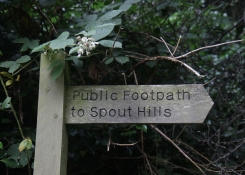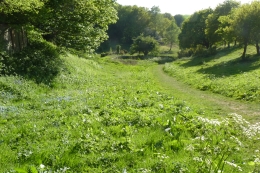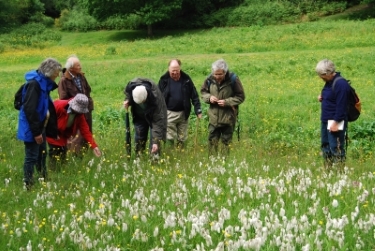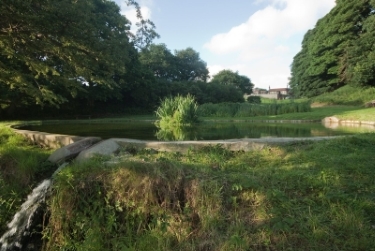Just Holt Articles
This is a small series of articles by Steve Benson (chairman of the society) for Just Holt magazine.
The Spout Hills
If you stand on Obelisk Plain at the west end of the town and look across the road, the first major building you will see is the glorious Victorian Methodist Church. Next to this is the fine Georgian Hill House and then as the Norwich road begins to sweep down towards Letheringsett there is a gap with a path leading towards Holt's secret wonder, the Spout Hills.
Since time immemorial an underground spring has bubbled to the surface there partly accounting for settlements at least since Roman times. Later the spring water was piped into a reservoir with a gulley running into the valley below. Later still in the 1880s a pumping station was built in the valley with a great water tower positioned on Shire Hall Plain. By 1959 both pumping station and tower had become redundant and had been dismantled.

By the enclosure Act of 1810 the common land surrounding the spring was set aside to residents of Holt for grazing and provided a natural playground for their children. It was also the place where great national events were celebrated by the locals - for example Queen Victoria's coronation in 1838 and her Golden Jubilee in 1887, the coronation of George V in 1911, the signing of the Treaty ending the First World War in 1919 and the coronation of Elizabeth II in 1953. Weeks of planning went into these events with the great and the good, the farmers and landlords, the churches and schools, the shopkeepers, the tradesmen and the townsfolk coming together to prepare for the great day.
The first of these celebrations was held on the Spout Hills on 12th August 1814 following Napoleon's abdication and exile on April 6th of that year. It was the "Festival at Holt given in commemoration of the happy return of Peace".
And what a day it was! The march of the 700 diners in their Sunday best to their designated tables, marshalled by their presidents and guided by bugles and signal guns, was like a military parade. The food was prepared at exactly the right time and cooked with precision. There were platforms for an orchestra, especially built tables and benches, tents and flags, refreshment marquees, and flowers and greenery in profusion. And when the feasting was over and the toasts drunk (there were 17 in all!) the games began.
Let the published account of the Festival take up the story:
 "the rustic youths now blindfold ran to catch the bell-man in the jingling-match, or rooted their heads in flour to find the hidden coin: now active girls skimmed lightly o'er the turf to win the promised hat, and tea-admiring dames rolled down the adjoining steep to gain their favourite drug [tea, nothing stronger!]: now lusty fellows chased the stubborn pig, struggling to catch him by the slippery tail, and now in total darkness trundled their clumsy barrows in many a devious maze to strike the winning post. In front, thousands of gazers filled the green hill's side and crowned its brow in varying groups; and higher still, the tents, the orchestra, and its waving standards closed the view".
"the rustic youths now blindfold ran to catch the bell-man in the jingling-match, or rooted their heads in flour to find the hidden coin: now active girls skimmed lightly o'er the turf to win the promised hat, and tea-admiring dames rolled down the adjoining steep to gain their favourite drug [tea, nothing stronger!]: now lusty fellows chased the stubborn pig, struggling to catch him by the slippery tail, and now in total darkness trundled their clumsy barrows in many a devious maze to strike the winning post. In front, thousands of gazers filled the green hill's side and crowned its brow in varying groups; and higher still, the tents, the orchestra, and its waving standards closed the view".
Of course it was all for nothing. They exiled Napoleon to Elba off the coast of Tuscany - far too close to France. He slipped away and raised his standard once more, entering Paris unopposed with his veterans flocking to him as he marched triumphantly to his nemesis at Waterloo in the following year. This time they found the less obligingly situated island of St Helena in the middle of the South Atlantic for him.
No matter. If you stroll today in the beautiful green oasis that is the Spout Hills, lovingly tended by its loyal band of volunteers, you can picture the teeming crowds and maybe hear the music, the applause and the laughter, of that magical day of days.



